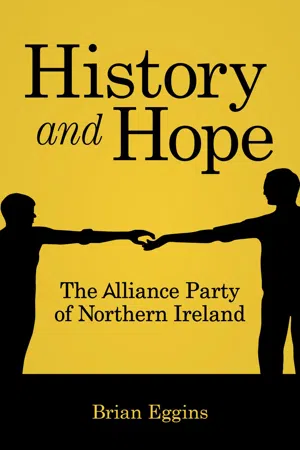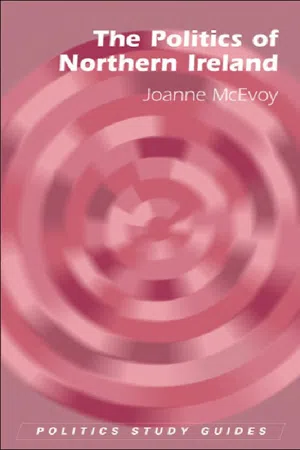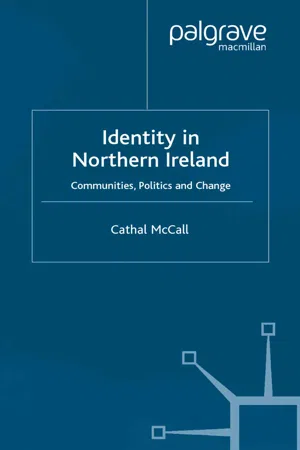Politics & International Relations
Alliance Party Northern Ireland
The Alliance Party Northern Ireland is a centrist political party in Northern Ireland. It was founded in 1970 and seeks to bridge the gap between the unionist and nationalist communities by promoting a shared future and inclusive politics. The party advocates for progressive policies and is known for its support of integrated education and a more consensual approach to politics in Northern Ireland.
Written by Perlego with AI-assistance
Related key terms
1 of 5
4 Key excerpts on "Alliance Party Northern Ireland"
- eBook - ePub
History and Hope
The Alliance Party of Northern Ireland
- Brian Eggins(Author)
- 2015(Publication Date)
- THP Ireland(Publisher)
9
Alliance Party principles and organisation
INTRODUCTION
This chapter includes a discussion of party principles and their application, party organisation and the major policy areas.PARTY PRINCIPLES
The Alliance Party was founded on the basis of a number of party principles which were inviolable. There are four main features of the party’s founding principles concerned with:1 The Alliance Party and the border2 Alliance as a party of reconciliation3 Economic approach and relation with other parties4 The rule of law and securityFrom the beginning the Alliance Party was guided by a set of principles, from which more detailed policies were developed.274 The first principle concerned a commitment to the union and to a devolved government. It said:We support the constitutional position of Northern Ireland as an integral part of the United Kingdom. We know that the overwhelming majority of our people share this belief and that provocative debate about it has been the primary cause of all our most fundamental troubles. The union is in the best economic and social interest of all citizens of the state. It also implies British standards of democracy and social justice, which will be energetically secured and steadfastly upheld. We are firmly committed to the principle of devolved government and would not support any attempt to suspend or dissolve the Northern Ireland parliament.In general, elections in Northern Ireland had been only about one thing – the border. They were largely a head count of those who supported the union with Great Britain (Unionists) and those who did not (Nationalists). This head count was roughly also a head count of Protestants and Catholics. Little attention was given to detailed everyday political policies.The Alliance Party tried to shift the emphasis from the border controversy towards the crucial need to combat sectarian division. This principle stated the simple fact that a clear majority of the Northern Ireland electorate was in favour of Northern Ireland remaining part of the United Kingdom (something that was duly demonstrated in the Border Poll of 1973) and that there were practical benefits in this. Nationalists called Alliance ‘a Unionist party with a small “u”’, while Unionists said that Alliance was ‘unsound on the border question’. The question of the Alliance Party’s attitude to the union with Great Britain and the relationships with the Republic of Ireland has always figured strongly in the attempts by political opponents to combat its cross-community appeal. This issue is discussed at some length in Chapter 5 - eBook - PDF
- Joanne McEvoy(Author)
- 2008(Publication Date)
- EUP(Publisher)
25 At the June 2001 Westminster election and local government election, Sinn Féin emerged as the largest nationalist party with 21.7 per cent and 21 per cent of the vote, respectively. Since the 1998 Agreement the party’s electoral support has continued to increase its share of Assembly seats (eighteen seats in 1998, twenty-four in 2003 and twenty-eight in 2007). In contrast, the party lost one of its fi ve seats in Dáil Éireann in the Irish Republic’s 2007 general election and was ruled out by Fianna Fáil as a potential coalition partner. In 2002 the Northern Ireland devolved institutions were sus-pended amid allegations of an IRA spy ring at Stormont and televi-sion images of a police raid at Sinn Féin party o ffi ces in Stormont were broadcast around the world. The party continued to dominate the nationalist bloc, however, and at the November 2003 Assembly elections the party won 23.5 per cent of the vote and twenty-four seats. Sinn Féin’s electoral support continued to grow as evidenced by the 2005 Westminster election when it polled 24.3 per cent of the vote and fi ve seats. Following the St Andrews Agreement in 2006 the party faced a tremendous challenge as it moved towards supporting the police, judiciary and the rule of law in Northern Ireland which it endorsed at a specially convened ard fheis in January 2007. Alliance Party of Northern Ireland The Alliance Party of Northern Ireland (APNI) was formed in April 1970 by a number of pro-O’Neill liberal unionists who left the UUP. 60 The Politics of Northern Ireland Alliance has been the main bi-communal, non-sectarian party in Northern Ireland, drawing support from both communities. However, the party has always broadly supported the union of Northern Ireland and Great Britain. While constitutionally unionist, it has been a con-sistent advocate of power sharing between unionists and nationalists. - eBook - PDF
Identity in Northern Ireland
Communities, Politics and Change
- C. McCall(Author)
- 1999(Publication Date)
- Palgrave Macmillan(Publisher)
Dialogue with the Alliance Party 183 Thirdly, there needs to be some protection for minority rights. We have proposed a Bill of Rights and other protections as well. The APNI currently upholds the modern delineation of North- ern Ireland as the dominant political entity. This position is main- tained by the party’s consistent support for a devolved form of government for Northern Ireland with a power-sharing executive based on the principle of weighted majority. 1 The APNI’s devol- utionist proposals indicate that, although the APNI recognizes struc- tural change in the EU and actively participates in extraterritorial party structures pertaining to it, the party continues to perceive the modern state as the structure on which a government for Northern Ireland should be based. An Extraterritorial Context The Downing Street Declaration opens the way for the estab- lishment of . . . an Assembly alongside practical and significant cross-border structures to deal with issues like Animal Health, Tourism, and Environmental Protection. Most importantly, of course, the Declaration is a firm written guarantee that both governments will respect the right of the people of Northern Ireland to determine their own future without coercion (APNI, 1994). At the beginning of the 1990s the APNI’s proposals for a system of government for Northern Ireland adopted an extraterritorial dimension that involved not only strengthening the European di- mension but also the development of bodies to facilitate cross-border co-operation where it would be mutually beneficial to North and South, as John Alderdice explains: We clearly have a relationship with the rest of the island from an economic, social and cultural point of view but because also a minority of people within Northern Ireland look to Dublin rather than to London for their political allegiance – it is important to recognize that. - eBook - PDF
Consociation and Voting in Northern Ireland
Party Competition and Electoral Behavior
- John Garry(Author)
- 2016(Publication Date)
- University of Pennsylvania Press(Publisher)
They also sought direct formal links between Northern Ireland and the Re-public of Ireland. Hence, while the consociational power-sharing settle-ment is “regional” in character (a subsystem of the wider UK system), the 1998 Agreement is also international in character. In addition to power sharing within Northern Ireland, the Agreement established formal links between Northern Ireland the Republic of Ireland and also between Ideology and Potential Support for British and Irish Parties 69 the Republic of Ireland and Britain. The north-south links take the form of the North-South Ministerial Council, and the east-west links take the form of the British-Irish Inter-Governmental Conference. Hence, there are firm political institutional links between Northern Ireland and the Republic of Ireland. A related question, then, is to what extent are there specifically political party-related institutional links? Are Republic of Ireland parties formally registered and organized in Northern Ireland and likely to compete in Northern Ireland elections? If so, what levels of support would they get? Crucially, for present purposes, would those determinants be ethnonational in nature or related to other factors such as social class and economic left-right beliefs? It may be seen as somewhat ironic to contemplate that people who live outside the Re-public of Ireland may discern class-related differences between the Irish parties when Republic of Ireland voters have a hard job doing so (Marsh et al. 2008). Hence, our investigation of the possible class basis of Irish par-ties is somewhat more speculative than our investigation of British parties. The Experience of British and Irish Parties in Northern Ireland The British Labour party does not stand in Northern Ireland elections, an abstentionist approach that has been strongly criticized by Labour party members in Northern Ireland. Boyd Black, for example, argues: “We have our two traditional political blocs.
Index pages curate the most relevant extracts from our library of academic textbooks. They’ve been created using an in-house natural language model (NLM), each adding context and meaning to key research topics.



